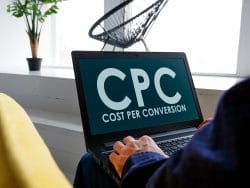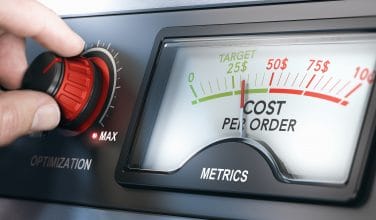Definition of Cost Per Click (CPC)
This article was published on August 14, 2011
Categorized in: Glossary
 Cost per click (CPC), also known as pay per click (PPC), is a term that has two different meanings. Cost per click refers to the total cost accrued by an advertiser when an ad is clicked on. This includes from listing the ad to the additional cost of the click-through by the visitor. Cost per click also refers to how much a search engine charges advertisers each time a visitor clicks on a sponsored link. Cost per click, simply put, means you pay for each click on your ads.
Cost per click (CPC), also known as pay per click (PPC), is a term that has two different meanings. Cost per click refers to the total cost accrued by an advertiser when an ad is clicked on. This includes from listing the ad to the additional cost of the click-through by the visitor. Cost per click also refers to how much a search engine charges advertisers each time a visitor clicks on a sponsored link. Cost per click, simply put, means you pay for each click on your ads.
Cost per click can vary based on a number of factors including how much a search engine charges as well as the popularity of keywords. When keywords are more popular, the more expensive the cost per click is for the advertiser and in turn increases how much the search engine makes.
How does cost per click work? You can set a maximum cost per click bid, also known as “max. CPC.” This is the maximum that you want to pay when someone clicks on your ad. In many cases, you will pay less than your max CPC, but you will never pay more than your max CPC. The final amount you pay is called “actual CPC.” Cost per click is a common model used by advertisers who want to set a daily budget for their advertising campaign. When the daily budget is reached, the ad is automatically removed for the rest of the billing period.
What are the benefits of cost per click? The cost per click model of advertising is transparent and beneficial for both advertisers and publishers. As the advertiser, you only pay for clicks on your ads, and publishers only earn money if relevant visitors are sent to your websites. If you are looking to drive as many potential customer to your website as possible for quick sales, the cost per click model is probably your best option. It’s also an easy model to employ if you take the time to calculate an acceptable cost per conversion. The results of cost per click are also easy to track.
Are there downsides to the cost per click model? Like most things, cost per click has its own downsides. There is something known as click fraud, where competitors will click on your ads repetitively so that you may suffer losses. You might also come to the conclusion that your ad campaign isn’t successful and remove it yourself. The good news is that Google and some other companies that have cost per click advertising have automated systems to guard against click fraud. You can find out if a company you are going to do business with also has this system in place.
Cost per click is overall one of the best options as it is flexible and can target a specific audience. You have control over how much you’re willing to spend per click. Cost per click is a powerful model for getting to your end goal.
Cost Per Click (CPC) Definition Sources:
LIKE AND SHARE THIS ARTICLE:
About the Author: Brick Marketing President, Nick Stamoulis
 Nick Stamoulis is President of Brick Marketing and has over 25 years of digital marketing experience. He works directly with clients on strategy and implementation, helping solve complex challenges through SEO, AI Search Optimziation (GEO), content marketing, social media, PPC, and conversion optimization. Nick Stamoulis has worked with over 500 companies across virtually every B2B industry and also provides digital marketing consulting and training classes, helping companies improve performance and achieve the digital marketing outcomes they are looking for.
Nick Stamoulis is President of Brick Marketing and has over 25 years of digital marketing experience. He works directly with clients on strategy and implementation, helping solve complex challenges through SEO, AI Search Optimziation (GEO), content marketing, social media, PPC, and conversion optimization. Nick Stamoulis has worked with over 500 companies across virtually every B2B industry and also provides digital marketing consulting and training classes, helping companies improve performance and achieve the digital marketing outcomes they are looking for.




